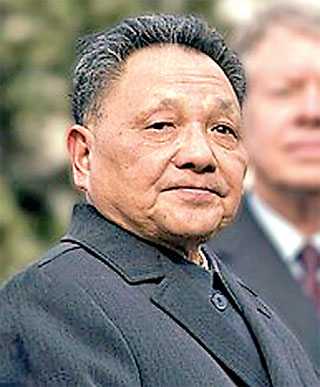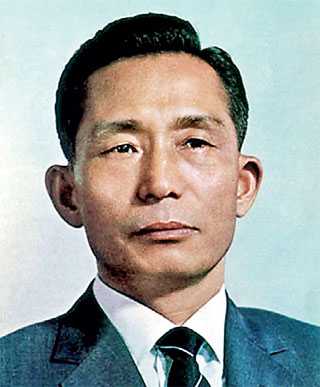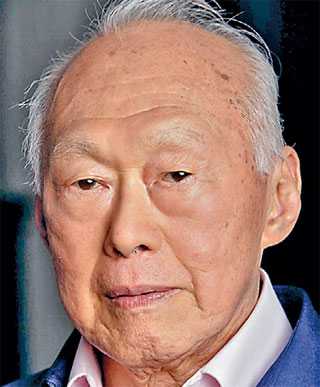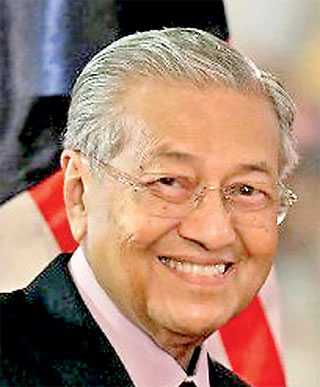Friday Feb 27, 2026
Friday Feb 27, 2026
Wednesday, 27 March 2019 00:00 - - {{hitsCtrl.values.hits}}
Readers might remember the article by this writer that appeared in the Daily Financial Times on 26 February titled ‘How can Sri Lanka avoid imminent economic collapse and extreme poverty?’
The Sinhala version of this article appeared in the Sunday Divaina of 24 February.
In these articles the strategies that have to be adopted to overcome political and policy instability particularly to attract Foreign Direct Investment (FDI) and measures to promote the improvement of the competitiveness of goods and services especially for export were mentioned.
What was not mentioned is that Sri Lanka needs to elect leaders who are capable of making all this happen to realise prosperity. Examples of such leaders are Park Chung Hee of South Korea, Deng Tsiao Ping of China, Mahathir Mohammad of Malaysia and of Singapore. Sri Lanka unfortunately has not been blessed with such leaders up to the present time.
 |
Deng Tsiao Ping |
 |
Park Chung Hee |
 |
Lee Quan Yew |
 |
Mahathir Mohammad |
The people of this country in fact feel that their leaders have not only failed to deliver on their basic needs but have also led the economy into a situation of bankruptcy, while robbing the taxpayer and in addition apparently conspiring to protect each other from prosecution. Hence the need to elect two new but effective leaders – a president and a prime minister – at the forthcoming elections.
What is the definition of an effective leader anyway? According to the Business Dictionary it is ‘the style of leadership in which the leader identifies the needed change, creates a vision to guide the change through inspiration, and executes the change with the commitment of the members of a group’. In fact in this article, effective leadership is described as, a) the ability and passion on the part of a person to convert a dream or a vision on behalf of the people into reality, b) by making ethical or moral judgments about the most practical key result strategies and actions to be implemented, c) by continuously communicating them among followers and d) inspiring a small team of people with the right kind of skills for executing them in an extraordinary manner; note the words used to describe an effective leader, especially the word ‘passion,’ which pushes the person concerned to overcome any difficulty to realise his/her dream or vision.
An entire chapter is in fact devoted to the subject of leadership in my book ‘Export Competitiveness and Poverty Alleviation’ published by the Godage Bookshop in 2017.
Vision
What could be a suitable vision for the country? South Korea desired to emulate or outdo Japan. Singapore strived to become the Switzerland of the East. Both these countries realised their visions right on target. Leaders of a country (or a firm or any other organisation) should have a vision or a dream of a desired long-term (20 to 30 years or more) and short-term state of greater goodness, rooted in the wishes of the people, for peace and prosperity.
Where Sri Lanka is concerned, one could be modest and just desire ‘to be a well-integrated, a well-governed and highly-prosperous nation state in South and South East Asia’, or we could be more ambitious. This vision is too broad and even vague. So the leaders have to convert it to goals (long-term objectives), qualitative objectives and quantitative targets.
How does one go about formulating a vision with strategies? Well, get an experienced strategist or corporate planner to conduct a few brainstorming sessions with a small group of leading citizens representing a cross section of society from among those representing the racial and religious groups, women, youth, workers, farmers, leading businessmen and so on to arrive at a suitable vision and strategy for the country.
The group has to first survey the present situation and identify the factors that impede or impel the realisation of the selected vision. These are the Strengths, Weaknesses, Opportunities and Threats (SWOT) in the way of realising the vision, goals, objectives, targets, etc. The person leading the discussion has to get the participants to stick to certain ground rules such as limiting the interventions to a couple of ideas under each of the SWOT for avoidance of lengthy and time wasting debates.
From these, the main strands only should be picked up as the selected short-term and long-term strategies, which could build on the strengths and opportunities and devise ways and means of overcoming the identified weaknesses and threats. The short-term strategies could be used create trust among the people.
It should also be mentioned that the vision document needs to be short as it is difficult for people to read and understand lengthy statements like the 50-page Vision 20/25 document of the present Government.
Moral purpose
The process or strategies advocated by the leaders to realise the vision must have an ethical and moral (righteous) purpose behind them to attract a mass of followers among the people. There is no moral purpose behind some of strategies proposed by most SL leaders.
For instance higher ethical and moral standards could help to reduce widespread corruption, which according to parliamentarian Vasudeva Nanayakkara who stated some time ago that 45% of public revenue is normally diverted into private hands annually. Since this extent of corruption is basically due to the opportunities for it created by the 1978 Constitution, it is clear that the new leaders to be elected have to commit themselves to a strategy of formation of a new constitution like that of the USA or India, to realise their vision.
It may also be very worthwhile to ask the question whether present day society in SL can produce leaders with a foundation of ethical and moral values; if not, what can parents, teachers, educationists and religious leaders could do about it?
Key result areas
The strategies have essentially to be selected on the basis of Key Result Areas (KRA)that yield most of the results needed (for instance 80% of output from 20% of input as in the case of the Pareto Principle); most governments in SL have tended to ignore certain KRA particularly national integration, development of technical and soft skills, export-oriented investments and land reform for alleviation of rural poverty; out of these the first KRA is the most important since SL can never hope even to begin to be prosperous without first integrating the various racial communities (described by some as ‘tribal’ groups) into a single nation state with a consensus to move forwards.
In fact our leaders tend to divide and rule taking advantage of the multi-racial nature of the population giving rise to frequent clashes among the different groups that obviously frighten particularly foreign direct investors who would be able to establish a flourishing export oriented manufacturing sector, which could provide well-paying jobs, especially to stop the outflow of foreign job seekers and even absorb the unproductive excess employment in the public sector as well as in rural agriculture, besides helping to pay off the large external debt of over $ 50 billion by expanding the export earnings of the country; to make this significant outcome to happen, a strategy of reconciliation among the racial groups is obviously needed, which of course requires the formation of a new constitution.
Practical strategies
The strategies and actions selected by effective leaders have in addition to be practical (as in the case of Communist China opting to adopt capitalist methods as well for economic development) and not ideological or theoretical, to succeed.
For instance in SL the decision to opt for ‘big’ government with running State-Owned Enterprises (SOEs) at a loss and continuing with massive public expenditure on defence even several years after defeating terrorism, in the midst of continuing government budget deficits, cannot be described as being practical; public private partnerships to infuse capital and better management practices in the case of the SOEs and quick reconciliation with the Tamil-speaking people to solve the ethnic problem, would have resulted in large budgetary savings for the Government (in addition to a better investment climate) and faster real economic growth to alleviate poverty which would have benefited the population, especially the majority community as they have the majority of the poor among them.
Import substitution by way of heavy import tariff/duty protection adopted by SL at present is also not a practical policy as the prices the consumers have to pay for such products tend to ‘sky rocket’ on account of the high unit costs (due to the smaller scale of production adopted to cater to the small internal market) plus the border taxes imposed to ensure protection of such industries. The competition among firms created by open market policies, (with a reasonable degree of protection for essential products) with an enabling environment of good governance and stable macro-economic (balanced budgetary) policies of the government on the other hand would encourage investors to start large-scale global-oriented projects with low unit costs or high productivity to produce value added goods and services for the export market.
Communication
The next attribute of great leadership is the rare ability of communication of the vision and the strategies clearly to the followers and the people in a language they could understand to create trust and ultimate consensus. An example is the ‘it does not matter whether the cat is black or white as long as it catches mice’, speech made by Deng Tsiao Ping of China, that persuaded over a billion people in a communist country to accept a capitalist approach to economic development in the late 1970s.
Leaders in certain countries as in SL and firms do not make the effort to create such consensus resulting in continued controversies and distractions from the right path to a vision. For instance leaders in SL even after 70 years of independence have not built a consensus regarding the type of economic policies to be adopted as to whether it is socialism, where the state assumes the role of promoter of growth as in the failed socialist state of Venezuela, where according to reports, thousands of people are either leaving the country or are dying of hunger, or social market economic policies where the private sector is the ‘engine’ of growth as in the case of the East Asian countries that have reached prosperity in spectacular fashion.
Small team
Wise leaders tend to surround themselves with righteous and wise advisers who may not have the correct political connections but have the right kind of experience and in addition select a small team of ministers (large teams being inefficient, ineffective and expensive as is the case of SL in recent times) and officials with the right skills and experience for implementation of the strategies. This can be done successfully only by selecting them on merit alone as in Singapore.
The merit that is in great demand and most suited for achievement of success is management ability, knowledge, and experience and not mere qualifications. Unfortunately in SL it is the politicians (most of whom are barely literate) as well as heads of institutions selected on the basis of political affiliations (article 55 of the constitution permits this), who seem to take important administrative and policy decisions with questionable consequences.
Above all leaders also have to inspire their followers and their team members in the implementation of strategies to be used to realise the vision, to prompt them to achieve extraordinary results, by giving credit where credit is due, striving for excellence and living by example.
Conclusion
So, at the forthcoming elections the people of SL have an unavoidable duty to perform, that is to elect a set of leaders with the characteristics mentioned above, especially a ‘passion’ or devotion to serve the people, first to avoid economic collapse, and second to lay the foundation for a system of development that encourages investment for the production mainly of globally competitive export products, leading to a faster rate of economic growth and higher real(inflation adjusted) incomes for the people.
(The writer is a Development Economist.)